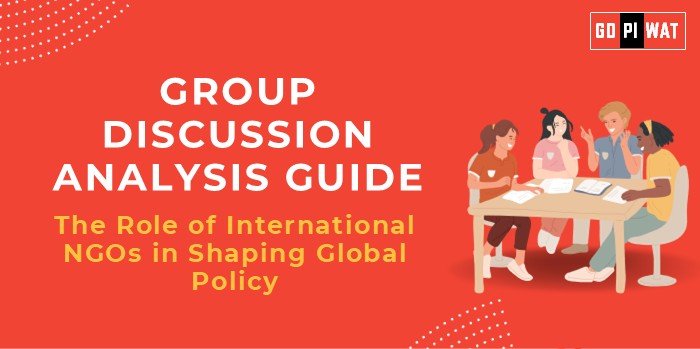📋 Group Discussion Analysis Guide
🌍 The Role of International NGOs in Shaping Global Policy
💡 Introduction to the Topic
🌱 Opening Context: International NGOs (INGOs) have grown into influential players in global governance, shaping policies across critical domains such as climate change, human rights, and public health. Their transnational reach and grassroots engagement make them pivotal in a globalized world.
📜 Topic Background: Since the establishment of institutions like Amnesty International in the 1960s, INGOs have expanded their role from advocacy to active policymaking. They often operate in partnership with governments, corporations, and international bodies like the UN to influence policy through research, lobbying, and on-the-ground programs.
📊 Quick Facts and Key Statistics
- 🌐 Number of INGOs: Over 37,000 worldwide, reflecting their significant presence.
- 🌍 Climate Initiatives: INGOs like Greenpeace influenced the Paris Agreement, signed by 196 countries.
- 💰 Funding: INGOs mobilize over $30 billion annually, underscoring their resource capacity.
- 📈 Public Trust: INGOs rank high in trust surveys, surpassing governments in many regions.
🌍 Stakeholders and Their Roles
- 🏢 International NGOs: Lead advocacy and program implementation. Examples: Oxfam, Médecins Sans Frontières.
- 🏛️ Governments: Partner with INGOs for localized solutions.
- 🌐 International Organizations: Collaborate on policy frameworks (e.g., WHO with NGOs on health initiatives).
- 👥 Communities: Primary beneficiaries and implementation partners.
🏆 Achievements and Challenges
🌟 Achievements:
- ✔️ Climate Action: INGOs were key drivers in global frameworks like the Paris Agreement.
- ⚕️ Public Health: INGOs like Médecins Sans Frontières have improved health access in conflict zones.
- 📢 Human Rights Advocacy: Organizations like Amnesty International have brought global attention to abuses.
⚠️ Challenges:
- 📉 Accountability Issues: Concerns over transparency and governance.
- 💵 Resource Dependence: Heavy reliance on donor funding may compromise neutrality.
- ⚔️ Political Resistance: INGOs face resistance in countries like Russia and India.
🌍 Global Comparisons:
- ✅ Successful Example: The Red Cross’s work during natural disasters is a gold standard.
- ❌ Challenges: INGOs face expulsion in restrictive regimes, such as in Myanmar.
📜 Case Studies:
- 🌿 Greenpeace: Successfully lobbied for environmental safeguards in the Amazon.
- 🤝 Oxfam: Controversy in Haiti highlighted the need for stronger oversight.
✨ Structured Arguments for Discussion
- 💬 Supporting Stance: “INGOs bring expertise and resources that governments often lack, accelerating policy implementation in critical areas.”
- ⚖️ Opposing Stance: “The influence of INGOs can undermine national sovereignty and lead to policy imbalances.”
- 🔄 Balanced Perspective: “While INGOs enhance policy through innovation, challenges like accountability and local integration remain.”
🎯 Effective Discussion Approaches
📖 Opening Approaches:
- 📊 “INGOs mobilize $30 billion annually, yet face questions about their accountability.”
- 🌍 “The Paris Agreement is a testament to the power of INGOs in global policymaking.”
🔄 Counter-Argument Handling:
- 📢 Rebuttal: “While INGOs may face accountability issues, their contribution to global crises like Ebola is undeniable.”
- 💡 Counterpoint: “Enhanced regulations can mitigate INGOs’ challenges without stifling their work.”
📈 Strategic Analysis of Strengths and Weaknesses
- 💪 Strengths: Global reach, grassroots networks, resource mobilization.
- ⚠️ Weaknesses: Dependency on donors, political interference.
- 💡 Opportunities: Tech-based advocacy, partnerships with private firms.
- 🚨 Threats: Rising nationalism, restrictive regulations.
📚 Connecting with B-School Applications
- 🌟 Real-World Applications: Analyze the role of INGOs in sustainable development during projects.
- 💬 Sample Interview Questions:
- “How do INGOs balance global policy advocacy with local needs?”
- “Evaluate the impact of INGOs on economic inequality.”
- 📖 Insights for Students:
- Study partnerships and funding mechanisms for case competitions.


